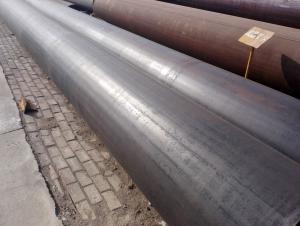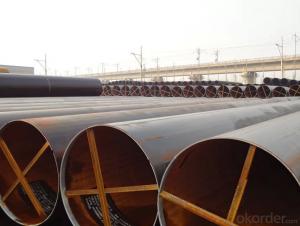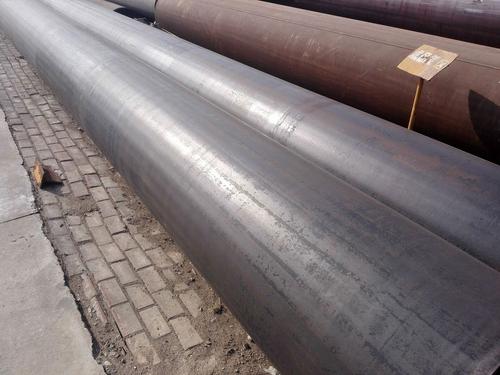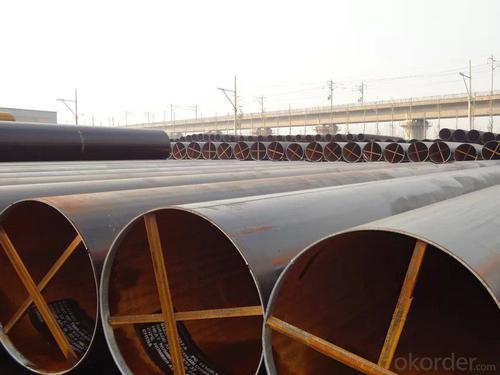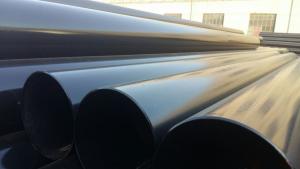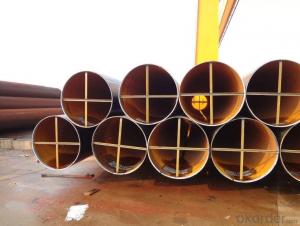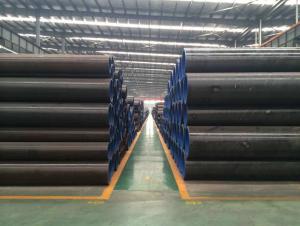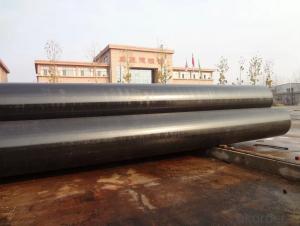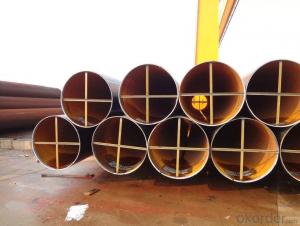Caliber double sided submerged arc welded pipe
- Loading Port:
- Tianjin
- Payment Terms:
- TT or LC
- Min Order Qty:
- 40 m.t.
- Supply Capability:
- 6000 m.t./month
OKorder Service Pledge
OKorder Financial Service
You Might Also Like
Product Description:
1、Structure of Welded Steel Tube:
Welded Steel Tube is formed by drawing a solid billet over a piercing rod to create the hollow shell. We are company that have many years experience and professional manager team and engineer team and sales team, sure we will provide you high quality of welded pipe and professioanl service.
2、Main Features of the Welded Steel Tube:
• High manufacturing accuracy
• The higher strength
• The small inertia resistance
• Strong heat dissipation ability
• Good visual effect
• Satisfy price
3、Welded Steel Tube Specification:
Standard | GB, DIN, ASTM ASTM A106-2006, ASTM A53-2007 |
Grade | 10#-45#, 16Mn 10#, 20#, 45#, 16Mn |
Thickness | 8 - 33 mm |
Section Shape | Round |
Outer Diameter | 133 - 219 mm |
Place of Origin | Shandong, China (Mainland) |
Secondary Or Not | Non-secondary |
Application | Hydraulic Pipe |
Technique | Cold Drawn |
Certification | API |
Surface Treatment | factory state or painted black |
Special Pipe | API Pipe |
Alloy Or Not | Non-alloy |
Length | 5-12M |
Outer Diameter | 21.3-610mm |
Grade | 20#, 45#, Q345, API J55, API K55, API L80, API N80, API P110, A53B |
Standard | ASME, ASTM |
1) Material:20#(ASTM A 106/A53 GRB.API5LGRB,GB),45#,16Mn,10#.
2) Specification range:OD:21.3-610mm,WT:6-70mm,length:6-12m or according to the requirement of clients.
3) Excutive standards:GB,ASME API5L.ASTM A 106/A53,Despite of the above standards,we can also supply seamless steel pipe with standard of DIN,JIS,and so on,and also develop new products according to the requirements of our clients!
4) Surface:black lacquered,varnish coating or galvanized.
5) Ends:Beveled or square cut,plastic capped,painted.
6) Packing:bundles wrapped with strong steel strip,seaworthy packing.
4、Packaging & Delivery
Packaging Details: | seaworthy package,bundles wrapped with strong steel strip |
Delivery Detail: | 15-30days after received 30%TT |
5、FAQ of Welded Steel Tube:
①How is the quality of your products?
We have many years business experience in this area, and we have professional engineer and manager team and sure we can provide you high quality production and professional service.
②How about price?
If you like bargain and factory price is not low enough as you think, just don’t waste your time.Please trust the quotation we would give you, it is professional one.
③Why should you chose us?
We can give you both.Additionally, we can also offer professional products inquiry, products knowledge train(for agents), smooth goods delivery, exellent customer solution proposals.Our service formula: good quality+good price+good service=customer’s trust.
6、 Welded Steel Tube Images:
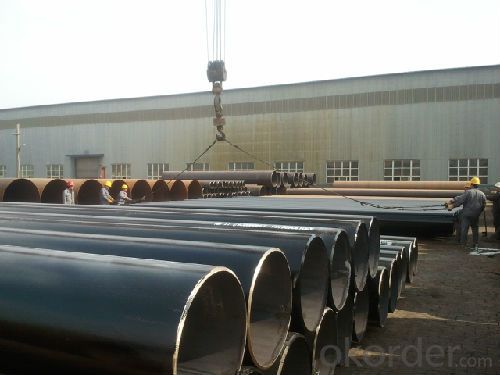
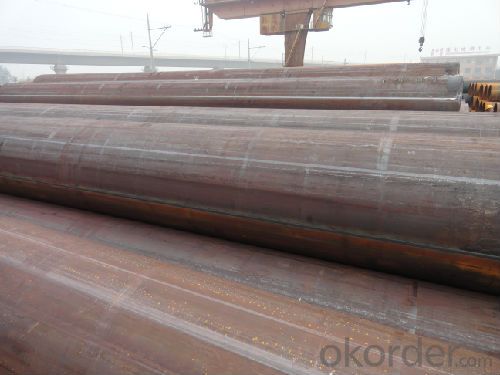
- Q: How are steel pipes used in the construction of gas distribution networks?
- Steel pipes are commonly used in the construction of gas distribution networks due to their durability, strength, and ability to withstand high pressure. These pipes are used to transport natural gas from the source to homes, businesses, and industries. The steel pipes are laid underground and connected using fittings and valves to create a network that efficiently distributes gas. It ensures a safe and reliable delivery of gas to consumers while minimizing the risk of leaks or accidents.
- Q: How are steel pipes tested for quality control?
- Steel pipes are tested for quality control through various methods such as visual inspection, dimensional checks, and non-destructive testing techniques including ultrasonic testing, magnetic particle inspection, and hydrostatic pressure testing. These tests ensure that the pipes meet the required specifications, standards, and structural integrity, ensuring their quality and reliability.
- Q: What are the different methods of non-destructive testing for steel pipes?
- Some of the different methods of non-destructive testing for steel pipes include ultrasonic testing, magnetic particle testing, eddy current testing, radiographic testing, and visual inspection. These methods are used to detect surface and subsurface defects, such as cracks, corrosion, and discontinuities, without causing any damage to the pipes.
- Q: How are steel pipes affected by international trade policies?
- Steel pipes can be significantly impacted by international trade policies. Trade policies, such as tariffs or quotas, can increase the cost of importing steel pipes, making them more expensive for domestic consumers. On the other hand, trade policies that promote free trade can lead to increased competition and potentially lower prices for steel pipes. Additionally, trade policies may also affect the availability of certain types of steel pipes, depending on the regulations and restrictions imposed by different countries. Overall, international trade policies play a crucial role in shaping the market dynamics and influencing the supply, demand, and pricing of steel pipes.
- Q: How are steel pipes used in high-rise buildings?
- Steel pipes are commonly used in high-rise buildings for various purposes. They are primarily used for structural support as they provide strength and durability, allowing the building to withstand the vertical loads and forces that occur due to its height. Steel pipes are also used for plumbing systems, carrying water and other fluids throughout the building. Additionally, they can be used for HVAC systems, providing ventilation and air conditioning to each floor. Overall, steel pipes are integral components in high-rise buildings, ensuring the safety, functionality, and comfort of the occupants.
- Q: Are steel pipes suitable for use in acidic environments?
- Yes, steel pipes are generally suitable for use in acidic environments. However, the specific grade of steel and the concentration of the acid should be considered to ensure proper corrosion resistance. Coating or lining the pipes with materials such as epoxy or rubber can also enhance their resistance to acidic conditions.
- Q: What are the advantages of using steel pipes in the manufacturing industry?
- Steel pipes offer several advantages in the manufacturing industry. Firstly, steel pipes are highly durable and have a long lifespan, making them ideal for handling heavy loads and withstanding harsh conditions. Secondly, steel pipes are resistant to corrosion, rust, and chemical reactions, ensuring that the material being transported or processed remains uncontaminated. Additionally, steel pipes have high tensile strength and can withstand high pressure, making them suitable for various applications like transporting liquids, gases, and solids. Furthermore, steel pipes are versatile and can be easily customized to meet specific manufacturing requirements. Lastly, steel pipes are cost-effective due to their longevity, low maintenance needs, and recyclability, making them an economical choice for the manufacturing industry.
- Q: How do steel pipes compare to other pipe materials like PVC or copper?
- Steel pipes have distinct advantages over other pipe materials like PVC or copper. Firstly, steel pipes are extremely durable and can withstand high pressure and temperature, making them suitable for various industrial applications. They also have a longer lifespan compared to PVC or copper pipes, reducing the need for frequent replacements. Moreover, steel pipes are highly resistant to corrosion and chemical reactions, ensuring a consistent flow of water or other substances. However, steel pipes are generally more expensive and require skilled labor for installation. PVC pipes, on the other hand, are lightweight, cost-effective, and easier to install, but they may not be as durable or resistant to extreme conditions. Copper pipes are known for their excellent heat conductivity and resistance to fire, but they are more expensive and require more maintenance. Ultimately, the choice between steel, PVC, or copper pipes depends on the specific requirements of the project and the factors of cost, durability, and functionality.
- Q: Are steel pipes recyclable?
- Yes, steel pipes are highly recyclable. They can be melted down and repurposed into new steel products without losing their quality or strength. Recycling steel pipes not only conserves natural resources but also reduces energy consumption and greenhouse gas emissions associated with steel production.
- Q: Can steel pipes be used for chemical storage tanks?
- No, steel pipes are not suitable for chemical storage tanks as they are not designed to handle the corrosive nature of many chemicals.
Send your message to us
Caliber double sided submerged arc welded pipe
- Loading Port:
- Tianjin
- Payment Terms:
- TT or LC
- Min Order Qty:
- 40 m.t.
- Supply Capability:
- 6000 m.t./month
OKorder Service Pledge
OKorder Financial Service
Similar products
Hot products
Hot Searches
Related keywords
